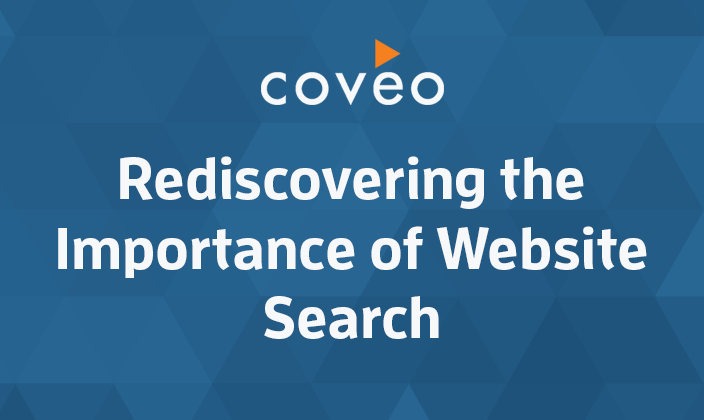Website search is making a comeback.
Great site search is the foundation of user experience; it’s what your customers want, and contrary to popular belief – you don’t need to be a rocket scientist to get it right. Your customers, like anyone else, will likely turn to your site first when they have a question or would like to learn more about your products or services. And when they do, they’re expecting quick and relevant results. By giving them what they’re looking for as they’re looking for it, they are empowered to self-serve, they are more satisfied, are inclined to spend longer on-site, will visit regularly and are more likely to convert. Companies are rediscovering the importance of website search and are seeing real results.
But having great site search goes beyond offering relevant search results, intelligent search enables you to constantly improve your search experience by understanding what your customers are searching for, what their pain points are, where there are content gaps and therefore enables you to create search-driven content pages that directly meet the needs of your customers. Additionally, intelligent search offers insights that help you refine your search functionalities and self-tune so that they are constantly optimized for a superior user experience.
Download our eBook, Best Practices for Site Search.
What does intelligent search look like?
Your site search experience should be consistent with the look and feel of your brand. However, under the hood, there are key components every website should have. Here’s what you need to master site search:
1. The search box.
Almost half of your visitors use your search box when looking for a product or category so it’s important that your search box is doing the heavy lifting and is working hard to get them what they need. In order for it to do so, it needs to be prominent on your site, simple to use and intelligent. Intelligent search uses advanced query suggestions and offers up the most relevant content, based on prior successful outcomes from content inside and outside your CMS.
2. The search page.
Remember, real people are interacting with your site so it needs to be ‘human friendly’. This means everything they’re looking for should be searchable and easy to navigate. Your search page should always deliver the most relevant results first, displayed in a clear and visually compelling fashion. Facets and filtering options will help drive deeper engagement on your search page and can fine-tune relevancy, according to the visitors profile. This will allow you to promote temporary results and configure search behaviour.
3. A search-driven content page.
Intelligent search-driven components go beyond typical search results. Search-driven pages are those that automatically deliver dynamic, relevant content using pre-programmed search queries, as opposed to static “hard coding.” Search-powered content components ensures your visitors will get the most relevant content first and they eliminate the need for administrators to manually update these pages when new content is available.
4. Content relevance.
To make your content as relevant as possible for each unique visitor, the outgoing queries should be packed with as many ‘contextual clues’ as possible. For example, your visitor’s geo-location, current browser, current operating system, and device. If your site requires a login, contextual clues can be leveraged from your visitor’s profile, including possibly their gender, age, purchase history and product(s) owned, or active support plans.
Intelligent search offers automated, self-tuning relevancy that boosts content based on your CMS database profiles and data. This delivers higher value content to your visitors and personalizes the search experience.
5. Search usage analytics.
The data generated by your intelligent search solution provides insight into how your visitors search for and use content on your site. Tracking and understanding this data is crucial to your success. With this data, you can identify search trends by seeing what your visitors are looking for, what topics are most important and what content you’re missing to help them self-serve. Your analytics also give you complete visibility of your visitors’ activity. You can see who is searching for what, what action they’re taking and what their user behaviour is. Last but certainly not least, your search usage analytics clearly identifies the path of success by showing which content was most helpful and what lead to a conversion.
Intelligent site search provides you the insight you need to make decisions your business cares about. While these key components are critical to delivering the search experience your visitors expect, there are best practices to follow that ensure optimal results. To learn more about intelligent site search and how your organization can master it, download our eBook, Best Practices for Site Search.


